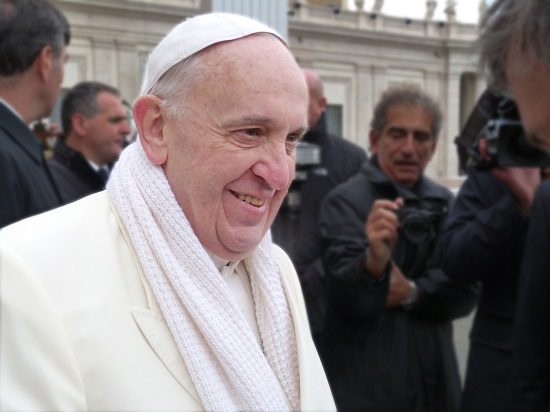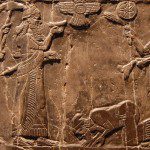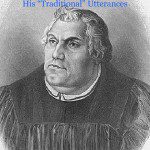***
***
[compiled from remarks of mine in a recent thread on my Facebook page. Thomas Hunt’s words will be in blue]***
It doesn’t matter what Pope Francis does. If he doesn’t care at all or about “PR”, or if he (on the other hand) becomes a master of all the “proper” techniques and media-savvy, it won’t matter a hill of beans. The secular society believes and spins what it will, regardless of any of that. Jesus and Paul and Peter didn’t care what the pagan Romans thought of their teachings. They just taught ’em. And that’s why they were all killed, along with some help from the Sanhedrin.
The pope can say anything and it’ll be distorted, and won’t satisfy his critics. Didn’t Ven. Pope Paul VI speak forcefully enough in 1968 about contraception? Did that stop the nonsense? No; the liberals went right on believing that the Church would change its teaching.
Since people are so obsessed about the Synod, let that decide for them. If some Catholic is so stupid as to not know that Church doctrine and dogma can’t change, then little will educate them in the first place. Laymen need to give assent to magisterial teaching and to not rashly speculate that it could change when in fact (for the faithful Catholic) this is impossible.
The pope works with the bishops. It’s called collegiality. The Synod will straighten out all the business about divorced Catholics and receiving communion. I’m not worried about it. Bishops say lots of stupid things. When they get together in councils the Holy Spirit does extraordinary things, despite the inevitable shortcomings of men. Bishops speaking individually are not the magisterium. The Synod is part of that. Synods take votes and decide issues. Case closed.
Cardinal Kasper seems to have some liberal views. I agree. All theological errors come from Germany and England and The Netherlands (+ the US). No surprise there. It was the same at Vatican II with Dollinger (who denied papal infallibility and was excommunicated). Ho hum. ZZZzzzz (-_-) .
One day all the chronic worriers and complainers will have to stop worrying about the pope and the Church: stop acting like they have no faith that God guides and protects her.
These standard, stock, garden variety complaints are very boring to me by now, after having observed them online for 17 years. Folks of a certain sort endlessly complained about John Paul II, who is now a saint (so people like former apologist Bob Sungenis now attack the canonization process as a result).
In the thread, Thomas Hunt, who was expressing many of these concerns wrote: “no one believes doctrine will officially change. Of course it won’t.” Great. So let’s get on with our lives, serving Christ, and relax and not be so concerned. There have always been problems in the Church, yet somehow we survive, don’t we? We’re still here teaching all the same biblical, apostolic stuff we’ve always taught.
Complaints and “o woe is us” lamentations are almost always silly and a waste of time. They don’t accomplish anything. This is why I keep advising the complainers and worriers to just relax and wait for the Synod to make its decrees. I’m not worried about it at all. The Church has made it this far and will continue to be the One True Church.
My point is that Cardinal Kasper is just one man and his views won’t prevail in the Synod. Much ado about nothing. Some people think it is a huge crisis that one bishop says stupid things. I yawn and say, “like this is something new, or anything that will change Church teaching”?
The faithful need not depend on one bishop or several liberal bishops (actually or imagined) to obtain their faith. They have all the resources under the sun available to help them: especially the Catechism. So I’m not worried about them. If they have to be led by the hand in everything, chances are they are lousy Catholics in the first place. I’m doing everything I can to help educate them in the faith and to try to spread the joy obtainable therein. But every man stands before God alone. Saying “my bishop taught me the wrong thing” won’t be any excuse on Judgment Day.
I wrote recently in my revised book about Orthodoxy, that Germany, England, and the US were the source of much of the dissent in the Church: that it was that way during Vatican I in 1870 and exactly the same today (“some things never change”). I don’t sit around worrying about it day and night. My philosophy is that spreading light overcomes the darkness. I defend Holy Mother Church and her true doctrines, and that is an excellent way to spend my time. Every time I teach truth I oppose any liberal bishop who is out there.
Pope St. John Paul II was bashed endlessly for not cracking down on liberals as much as the critics thought he should. When he kissed the Koran that was viewed as akin to Judas’ betrayal (and I was called a “modernist” for defending him at length several times and arguing that it didn’t mean all the nonsense it was said to have meant). Everything is exactly the same now as it always was.
The thing to do is what I’ve said all along in this thread: simply reiterate orthodoxy and let the loose cannons spout their nonsense if the must (just like bears crap in the woods), but with increasing irrelevancy as time goes on. The liberals and the heterodox thrive on attention: as do also the radical Catholic reactionaries on the other end of the spectrum. That’s most of their game. If we ignore them, they are deprived of the big thrill they get in being dissidents. Consequently, I do my best to ignore them as much as possible.
Thomas Hunt wrote about another in my thread (both are Catholics): “Your very personal approach is one you learned as a Protestant.” I replied:
That doesn’t necessarily follow. Blessed Cardinal Newman wrote a lot about how laymen opposed the many Arian bishops during the Arian crisis in the 4th century (when Protestantism was still 12 centuries away). If they had simply followed the bishops like sheep, wherever they led, we’d all be Arian Jehovah’s Witnesses today. But the laypeople knew their faith and played a crucial role in maintaining apostolic trinitarian orthodoxy.
How is it “Protestant” to simply say [as the second Catholic noted above, did], “I try to understand my faith by mining the teachings of the Church in Scripture, the Catechism and documents published by the Vatican”? That’s perfectly Catholic. There is nothing un-Catholic about it whatsoever. The Protestant doesn’t do that. He does only the first and not the second and third things. Then he takes a head count of how many Protestants believe so-and-so and decides which of the many hundreds of denominations to join. That is erroneous private judgment as a rule of faith; not what was written above.
It would be like claiming, “its a Protestant mentality to read Dave Armstrong’s books and learn more about the Catholic faith.” It’s no more “Protestant” than to read the layman Chesterton 90 years ago. Any Catholic who knows anything knows what the magisterium teaches and what it is, and whether a lay apologist like myself is accurately conveying and defending the same teachings or not. It’s perfectly possible, by virtue of seeking truth and asking God to guide one in that quest.
Clearly, it’s always better to have an orthodox bishop rather than a liberal one, but on the other hand, the resources are out there and Catholic truth awaits anyone who is serious about finding it. It’s as close as the Catechism.
We are what we eat. If we’re in an environment where there is a lot of modernist garbage, chances are we’ll pick up some of it. It’s almost inevitable unless we are vigilant and prayerful. It’s especially true among intellectuals, because they hate to be ostracized in academia as not “with it.” Even C. S. Lewis was spurned and despise among many of his Oxford colleagues and denied a professorship at Oxford (he only got one in the 50s when he moved to Cambridge).
We are supposed to look to our bishops, especially for teaching. When we cannot do that we suffer loss (all of us)–even if we can still find truth for ourselves by study and prayer. . . . Personal study is very good and necessary. But thinking that that means bad bishops don’t have a very negative effect on all of us, is naive.
All of us, huh? One bad bishop or 300 of them (if, theoretically, there were that many) doesn’t have the slightest effect on my Catholic life. Not one iota. It has absolutely zero effect on how I spend my day, how orthodox I am, my apologetics. Nothing. Zero, zip, nada, zilch.
What influences me is the magisterium and writings and lives of orthodox, obedient Catholics, the saints, the Bible, etc.
Yes, we look to bishops for teaching, but particularly in council, and in line with the pope, because that is when they are speaking magisterially. Individually, they do not have that charism. We give them a lot of respect, because they are in authority over us, but sometimes they can say erroneous things, and if we know our faith, we know when that happens and we are not obligated to accept their teaching at that point, because it’s wrong and false.
I already noted how in the 4th century, the laypeople massively rejected the Arian bishops. This is how Cardinal Newman developed his famous emphasis on laymen and the sensus fidelium, because he had studied that period of Church history. He in turn greatly influenced Vatican II, which brought back a renewed emphasis on the laity, which was only reclaiming an ancient heritage in the Church.
Thus, what I’m arguing right now is quite in line with Blessed Cardinal Newman and Vatican II: i.e., the magisterium and most developed Mind of the Church.
. . . implying that their influence is negligible because I can study for myself is a Protestant reaction.
It’s not at all. We are supposed to know our faith, just as Protestants do. It’s not an exclusively Protestant notion, to have an intelligent, educated, informed faith. They adversely influence ignorant Catholics. The problem is ignorance, not some supposed Protestant method if a Catholic actually knows his or her faith! You’re the one thinking like a Protestant here because you relegate entirely Catholic things into a supposed “Protestant-only” box, as if Catholics have to only be dumb sheep and be led entirely by bishops, and learn little or nothing on their own. That went out as early as the wide availability of books, and a corresponding widespread literacy, in the mid-15th century.
Catholicism does not allow us to be only individuals. We are always part of the flock.
No one said it did. [Name] said he studied the Bible, the Catechism and the councils. That’s utterly Catholic. Protestants only do the first thing, because they deny the infallibility of tradition and the Church, so that’s all they have in terms of bottom-line authority: how they try to solve problems. But they can’t do it with the Bible only, which is why they are so hopelessly divided.
I so very much want them to know the stunning beauty of the truth. Where will they hear it?
It remains true as always: “He who seeks shall find.” Catholic dogmatic and moral truth can be found, as I have said several times, in the Bible, in the Catechism, in the documents of Vatican II, in papal encyclicals, in a host of good websites and apostolates and books that have come out over the last 25 years, in the “apologetics revival.” If someone wants to know what the Church teaches, it’s easier than ever now to find it.
They ask God to guide them, in their seeking of truth, and He does! Or don’t you believe that? You think that God is limited to homilies and bishops, in leading and guiding the faithful, open, obedient Catholic disciple?
All of this is not ho-hum to me. Maybe I am wrong, I cannot believe it is ho-hum to you, that I somehow misread your intent.
You obviously have. Read my words in context, rather than continually reading into them. It’s not ho-hum to me that people don’t know Catholic truth. Good heavens! I’ve devoted my life to trying to make sure that they do know it, with great financial sacrifice and many other kinds of sacrifices.
What I’m saying are these things:
1. There have always been serious problems in the Church. It’s nothing new, and is as old as Judas, the ancient Corinthians, Galatians, and seven churches of Revelation.
2. Anyone (whatever one bishop or a hundred say) who seeks will find, and it’s now easier than ever (with the Internet) to locate orthodox Catholic teaching. Somehow in the 4th century, laypeople by the millions knew what was orthodox teaching, despite the widespread heresy of Arianism taught by many bishops. Most of them couldn’t even read.
3. One overcomes the darkness by lighting a candle (by teaching, by prayer, by example, etc.), not merely complaining about the darkness.
4. Thus, if someone (like you) is worried about souls, then go out and take action (and this action includes prayer) to help those souls. I do it by teaching and apologetics. I’m doing something about it. People come into the Church and become more confident, informed Catholics as a result of my work. I show my concern by what I do with my life, by what I do for a living as my vocation. What are you and others who are so concerned, doing about it?
As for the cited author saying “this is no way to run a Church,” I agree with him that it is better to not have public wrangling about doctrines that can’t change anyway. If I didn’t agree with the article, I wouldn’t have linked to it.
The difference between you and I is the difference between doom-and-gloom pessimism and an anxious spirit, and an optimistic, sunny spirit that recognizes the problems, but knows that it is possible for individuals (and above all, the Church) to overcome them by God’s grace and through seeking the truth in all the means available to anyone now.
My second overall point is to say that this is how it always is, that it doesn’t matter (in the sense that you are worried about) if the pope allows these loose cannons to say their thing, or clamps down on them. The media and secular society will spin it the way they always do, anyway. People hear what they wanna hear.
Ven. (soon-to-be-Blessed) Pope Paul VI spoke forcefully and magisterially on the issue of contraception. He ended the dispute. It made no difference whatever. In fact, that was the closest we came to a wholesale widespread schism of the Church since (arguably) the “Reformation.” Many of the bishops were in outright rebellion against the pope. Multiple millions of Catholics simply didn’t care (because they think like Protestants or secularists or radical Catholic reactionaries or modernists, and think they can selectively dissent against Catholic dogma).
My mentor, Fr. John A, Hardon, was Paul VI’s adviser at the time, and used to talk in his Ignatian Catechist classes about how this holy pope felt as if he had a crown of thorns on his head, from the agony of enduring the dissent.
Dissent will always be present in the Church. The question then becomes: how do we deal with it? According to Fr. Hardon again (he knew a few things), there was a fear of widespread schism if liberalism was dealt with forcefully and widely, in terms of excommunications and what not. This is not mere speculation, either. We know what happened in England in the 16th century. Whole countries were lost to the Church.
The truth is asserted in the Church as it always has been, but there is a different overall approach. I think it is the right one. The liberals are largely dying out. The younger priests are much more orthodox. Things are changing. We just bide our time until most of the rebellious generation is dead and in their graves (just as with the rebel Hebrews in the wilderness under Moses).
If you had your way (if I am reading you correctly; I know this is what many people think), Pope Francis would excommunicate and defrock every liberal in the entire Church. And then what would happen? We could very well see 30 million (or more) Catholics leave the Church and follow these liberal dissidents. And what good would be accomplished by that? They would become more and more liberal and morally compromised over time than they are now, with many losing faith altogether.
That is to be avoided at all costs. What you worry about now (with some justification) would be a thousand times worse in every sense, if the pope in fact did what you and many such critics call for: a wholesale purging of anyone in the Church who isn’t 100% orthodox.
There is also an expressly, explicitly biblical justification for not weeding out all the heterodox dissidents. It’s not merely a supposed “modernist” approach, as if it were some novelty. There is a prominent motif of “sinners in the Church” that I have written about many times. Have you never read, for example, the parable of the wheat and the tares?:
Matthew 13:24-30, 36-42 (RSV): Another parable he put before them, saying, “The kingdom of heaven may be compared to a man who sowed good seed in his field; [25] but while men were sleeping, his enemy came and sowed weeds among the wheat, and went away. [26] So when the plants came up and bore grain, then the weeds appeared also. [27] And the servants of the householder came and said to him, `Sir, did you not sow good seed in your field? How then has it weeds?’ [28] He said to them, `An enemy has done this.’ The servants said to him, `Then do you want us to go and gather them?’ [29] But he said, `No; lest in gathering the weeds you root up the wheat along with them. [30] Let both grow together until the harvest; and at harvest time I will tell the reapers, Gather the weeds first and bind them in bundles to be burned, but gather the wheat into my barn.'” . . . [36] Then he left the crowds and went into the house. And his disciples came to him, saying, “Explain to us the parable of the weeds of the field.” [37] He answered, “He who sows the good seed is the Son of man; [38] the field is the world, and the good seed means the sons of the kingdom; the weeds are the sons of the evil one, [39] and the enemy who sowed them is the devil; the harvest is the close of the age, and the reapers are angels. [40] Just as the weeds are gathered and burned with fire, so will it be at the close of the age. [41] The Son of man will send his angels, and they will gather out of his kingdom all causes of sin and all evildoers, [42] and throw them into the furnace of fire; there men will weep and gnash their teeth.
The “revised traditionalist version” of the Bible, on the other hand, would render the passage as follows:
[28] . . . The servants said to him, `Then do you want us to go and gather them?’ [i.e., the weeds] [29] And he said, `Yes; because if you don’t gather the weeds, the wheat gets corrupted along with them. [30] Separate them until the harvest; . . .
We mourn and weep for sin, expressed error, and loss of souls, of course. But we do so with an ultimate stance of hopefulness that God is merciful and just, and that anyone who seeks Him will find Him.
Many people in the Church do little else than complain and think they know better than bishops and popes, yet do nothing constructive to help alleviate the problems. I’ve been interacting with them for 17 years online and sometimes in “real life” too.
The faithful Catholic will consult the results of synods like this one coming up, rather than read media spin about what the media and secular / liberal world would love to happen, and its spin afterwards which pretends that the orthodox decrees actually aren’t, and have loopholes, etc. (just as occurred with Vatican II).
* * * * *














